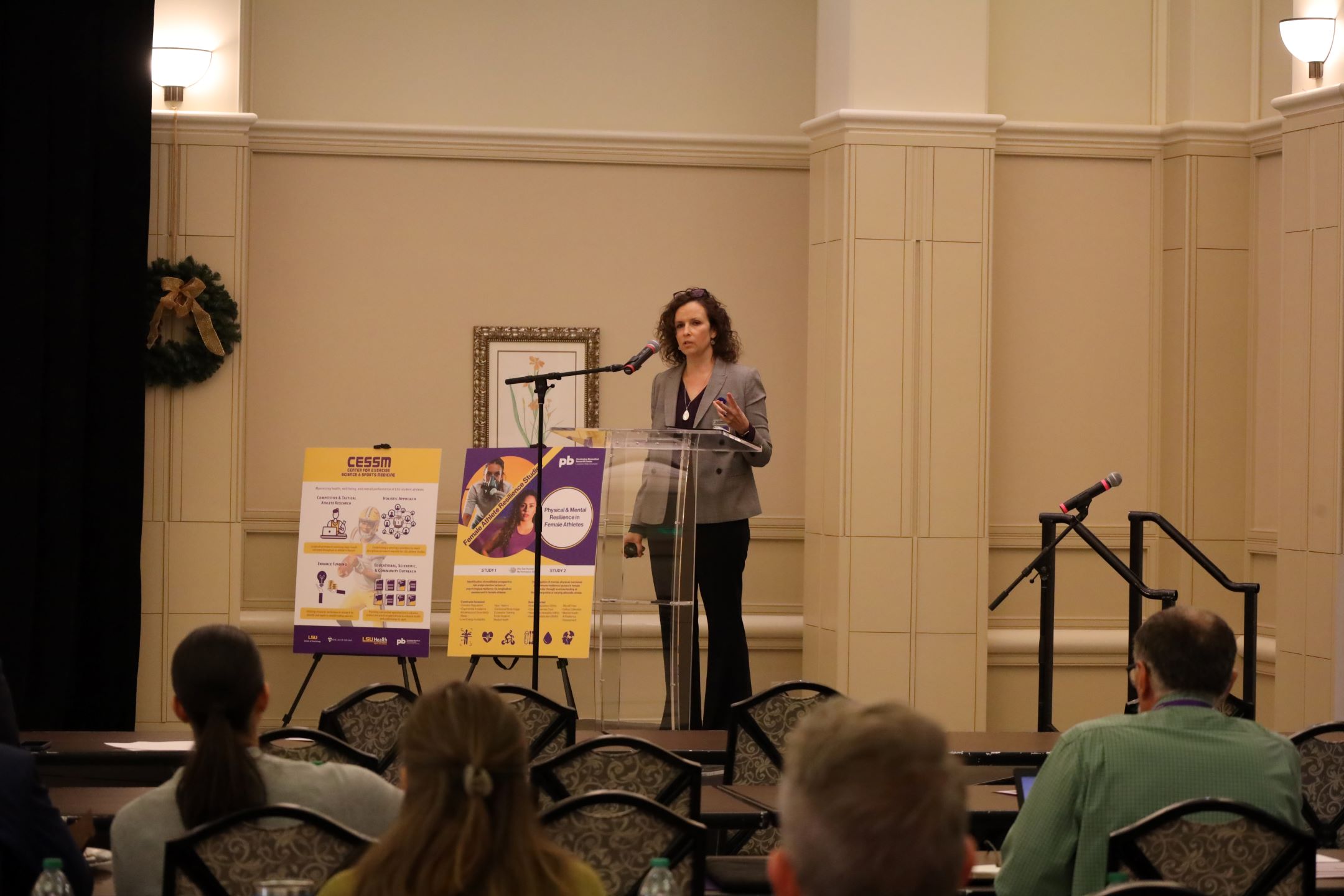Research Projects
The mission of the Behavior Technology Laboratory is to investigate the impact of novel assessment, prevention, and intervention approaches delivered through technology to unique populations to improve their health, performance, and resilience.
Current Research
![]()
The Assessment of Female Athlete Resilience
Wu Tsai Center of Excellence for Female Athlete Health and Performance Alliance
at Harvard Medical School*
Tiffany Stewart, Ph.D. (PI), Pennington Biomedical
Carolyn Becker, Ph. D. (Co-PI), Trinity University
Miriam Rowan, PsyD (Co-PI), Boston Children’s Hospital
Kate Ackerman, MD, Women’s Health, Sports & Performance Institute
Nicole Wesley, MPA, Pennington Biomedical
Kelsey Varzeas, Ph.D., Pennington Biomedical
Vivienne Hazzard, Ph.D., Michigan State University
Emily Matheson, Ph.D., Consultant
Psychological resilience is a critical determinant of athlete health and performance, yet it remains underexplored in female athletes. This project takes an innovative longitudinal approach to define resilience more precisely and identify modifiable risk and protective factors that shape it. This study examines key constructs—including emotion regulation, intolerance of uncertainty, sleep, low energy availability, injury history, body image, training practices, and social support—across time, while also accounting for differences by age and sexual/gender minority status. In addition, the team tested the predictive validity of resilience for depression, anxiety, eating disorder symptoms, substance use, and psychosocial stress. An ancillary study incorporated WHOOP fitness trackers to provide objective sleep and recovery data, advancing integration of physiological and psychological markers of resilience. By moving beyond cross-sectional research, this project represents a critical first step toward identifying actionable factors that can inform resilience-building interventions. Findings have already yielded multiple publications and provide a strong foundation for future grants. Ultimately, this work aims to guide the development of scalable, evidence-based training programs to strengthen resilience in female athletes.
* We acknowledge support of this work by the Wu Tsai Human Performance Alliance at Harvard University and the Joe and Clara Tsai Foundation.
![]()
Physical & Mental Resilience in Female Athletes
Wu Tsai Center of Excellence for Female Athlete Health and Performance Alliance
at Stanford University*
Tiffany Stewart, Ph.D. (PI), Pennington Biomedical
Guillaume Spielmann, Ph.D. (Co-I), Department of Kinesiology, Louisiana State University
Neil Johannsen, Ph.D. (Co-I), Department of Kinesiology, Louisiana State University
Carolyn Becker, Ph. D. (Co-I), Trinity University
Nicole Wesley, MPA, Pennington Biomedical
Rachel Matthews, Ph.D., Department of Kinesiology, Louisiana State University
Youyoung Kim, Ph.D., Department of Kinesiology, Louisiana State University
Female athletes face unique and chronic stressors—including academic pressures and competitive demands—that place them at heightened risk for impaired immune function, elevated hormonal stress responses, and declines in mental health, performance, and resilience. Despite these risks, optimization strategies and resilience-focused approaches remain under-investigated in this population. This innovative project advanced the science of athlete resilience by examining the mental, physical, hormonal, and immune factors that underlie adaptation to stress in female athletes. The study assessed resilience across three timepoints: baseline (V0), moderate allostatic stress load driven by training (V1), and high allostatic stress load during combined academic and competitive demands (V2), separated by pre-season (T1) and in-season (T2) training periods. Through this design, the project evaluated how repeated exposure to academic and competitive stressors impacts biomarkers of immune competency and stress, including salivary immune markers, heart rate variability (HRV), and stress hormones. It also assessed physiological responses to exercise—heart rate, ventilatory thresholds, and blood lactate—across stress periods, while linking these physiological measures to mental health and psychological resilience. By integrating psychological, physiological, and biological markers, this work provides one of the first multidimensional profiles of resilience in female athletes. The findings not only clarify mechanisms by which chronic stress undermines resilience but also inform the design of future controlled trials and resilience-based interventions. Ultimately, this research paves the way for evidence-based strategies to optimize athlete schedules, training, and support systems that protect both health and performance.
* We acknowledge support of this work by the Wu Tsai Human Performance Alliance at Stanford University and the Joe and Clara Tsai Foundation.

Aim High: Readiness & Meeting the Standards in Military Pre-Recruits
Center for Military Performance & Resilience Program Project
Department of Defense (DOD)
Tiffany Stewart, Ph.D., Principal Investigator
MAJ Michael Switzer
Nicole Wesley, MPA
Felicia Chaisson, Ph.D.
Kelsey Varzeas, Ph.D.
Heather Brady, MA
Catherine Thomas, RDN
Roughly 77% of young Americans would not qualify for military service without a waiver due to lack of fitness required to join (passing required body composition standards and/or pass physical fitness tests) being on certain medications or having mental and physical health difficulties. A large part of the recruiting pool is unable to join due to these readiness issues. This project aims to develop and pilot test a scalable, integrated physical and mental optimization training program with interactive, evidence-based programming to ready young cadets to join the military in a high school aged population.

Four Pillars of Defense: A Whole Health Approach to Military & First Responders
Center for Military Performance & Resilience Program Project
Department of Defense (DOD)
Tiffany Stewart, Ph.D., Principal Investigator
MAJ Michael Switzer
Nicole Wesley, MPA
Felicia Chaisson, Ph.D.
Kelsey Varzeas, Ph.D.
Heather Brady, MA
Catherine Thomas, RDN
Interdisciplinary approaches to optimizing human and operational performance directly impact Soldier and unit readiness, improving Soldier health and resilience. Current efforts to deliver these approaches have limited functional integration and lack consistency in formal training and delivery, impacting skill development and application. This project aims to build on prior work funded by the DOD, develop and pilot test a scalable, integrated physical and mental optimization training app that would be embedded into relevant systems and expanded to other high-performance populations, e.g. other branches of the military, first responders.

Institute for the Health & Performance of Champions
Provost Big Idea Grant
Guillaume Spielmann, Ph.D. (PI), Department of Kinesiology, Louisiana State University
Neil Johannsen, Ph.D. (Co-I), Department of Kinesiology, Louisiana State University
Tiffany Stewart (Co-I), Ph.D., Pennington Biomedical
Shelly Mullenix, ATC, LCSW (Co-I), Athletics, Louisiana State University
Hollis O’Neal, MD (Co-I), Our Lady of the Lake
Robert Zura, MD (Co-I), LSU Health Sciences Center
This multi-campus grant is dedicated to promoting student athlete health, well-being, and overall performance in the very competitive world of collegiate athletics. This grant provides the seed funding for the creation of the Institute of the Health and Performance of Champions; a natural progression of existing partnerships between researchers included in this proposal and LSU Athletics. This project will: 1) formally recognize this multi-campus collaboration targeting high performance populations, e.g athletes, tactical athletes, first responders, and 2) collect initial cross-sectional data on the impact of training cessation on the health and well-being of former LSU athletes.

Collaboration in Action Grant
Neil Johannsen, Ph.D. (PI), Department of Kinesiology, Louisiana State University
Guillaume Spielmann, Ph.D. (Co-I), Department of Kinesiology, Louisiana State University
Tiffany Stewart, Ph.D. (Co-I), Pennington Biomedical
Shelly Mullenix, ATC, LCSW (Co-I), Athletics, Louisiana State University
Samuel Stroope, Ph.D. (Co-I), Department of Sociology, Louisiana State University
Hollis O’Neal, MD (Co-I), Our Lady of the Lake
Robert Zura, MD (Co-I), LSU Health Sciences Center
While regular moderate-intensity exercise is associated with well-documented health benefits, prolonged exposure to elite-level athletic competition can heighten risks of injury, cardiovascular dysfunction, and psychological strain. Yet despite increasing concern, the long-term health effects of sport cessation among retired collegiate athletes remain poorly understood. Former athletes, particularly in weight-focused sports such as football, commonly experience substantial post-retirement body composition changes that elevate risk for cardiometabolic disease. However, whether similar risks extend across other sports, or impact outcomes such as immune function and psychological well-being, is largely unknown. This project represents an innovative effort to examine the long-term health trajectories of former LSU athletes, spanning 1 to 25 years post-retirement, across all sports. The study integrates cardiovascular, immune, and psychological assessments with evaluations of social determinants of health (SDOH), a critical but understudied dimension of athlete well-being. Data collection will include cardiometabolic testing (Quest Fitnescity), immune and laboratory measures (Quest Diagnostics), and psychological/SDOH surveys (Qualtrics), with recruitment conducted through direct outreach to former athletes. The significance of this work lies in its potential to establish one of the first comprehensive, longitudinal platforms for understanding athletes’ health trajectories—from sport initiation through retirement to morbidity and mortality. Such research is only possible through cross-disciplinary collaboration, bridging expertise in physiology, immunology, psychology, and social sciences. By identifying long-term health risks and protective factors, this study will generate essential pilot data to guide interventions, improve quality of life, and support smoother transitions out of competitive sport.
Previous Research

The Female Athlete Body Project (FAB)
National Institutes of Health
NIH 1 RO1 MH094448-01
Tiffany Stewart, Ph.D. (PI), Pennington Biomedical
Carolyn Becker, Ph.D. (Co-I), Trinity University
Nicole Wesley, MPA, Pennington Biomedical
Lisa Kilpela, Ph.D., Trinity University
Kelly MacKenzie, Ph.D., American University
Athena Argyropoulos, American University
Shelly Mullenix, ATC, LCSW, Louisiana State University
Jamie Meeks, RD, CSSD, Louisiana State University
Eating disorders (EDs) represent a pressing public health concern due to their high treatment costs, significant morbidity, and elevated mortality rates. Preventive approaches are therefore of critical importance. The Healthy Weight (HW) program, which emphasizes small, sustainable lifestyle modifications, has shown promise in reducing risk factors and preventing the onset of EDs in at-risk populations. Female athletes represent a particularly vulnerable group. Disordered eating behaviors are not only prevalent in this population but also especially hazardous, as they contribute to the Female Athlete Triad—a condition defined by low energy availability/disordered eating, menstrual dysfunction, and reduced bone mineral density/osteoporosis—which in turn increases risk for injury and long-term health consequences. This project advanced the science of prevention by conducting a cluster randomized controlled trial to test the effectiveness of the HW intervention among 500 collegiate female athletes across three diverse sites: Louisiana State University (Baton Rouge, LA), Trinity University (San Antonio, TX), and American University (Washington, D.C.). By focusing on an underserved and high-risk population, this study contributes novel evidence regarding scalable, evidence-based prevention programming. Its findings have the potential to shift the paradigm of athlete care by embedding early intervention strategies directly within collegiate athletic systems, ultimately reducing the burden of eating disorders and enhancing athlete health, performance, and resilience.
![]()
Sport Carried Onward for Resilience & Enrichment (S.C.O.R.E.)
Tiffany Stewart, Ph.D., Principal Investigator
Nicole Wesley, MPA
Felicia Chaisson, Ph.D.
Kelsey Varzeas, Ph.D.
Heather Brady, MA
Catherine Thomas, RDN
Nearly 8 million students participate in high school athletics in the United States each year. Of these, just over 480,000 advance to compete as NCAA athletes, and only a select few transition to professional careers. For the vast majority, athletic participation ends by early adulthood. Yet, student athletes dedicate countless hours to training and competition, shaping not only their skills but also their sense of identity. Sport becomes central to who they are—defining their social circles, daily routines, and long-term goals. Collegiate athletics place students in high-performance environments marked by intense expectations and unique rewards. While this environment can cultivate discipline, resilience, and achievement, it also generates significant pressures to perform and conform to sport-specific norms. As a result, athletes are not immune to mental and behavioral health struggles. While many collegiate athletes are offered mental health services, these are often narrowly focused on sports performance. Stigma and athletic culture can further discourage athletes from seeking support for broader mental health or well-being needs. This gap underscores the urgent need for programs that extend beyond performance-based mental health services to address the full spectrum of athlete well-being. The S.C.O.R.E. (Sport Carried Onward for Resilience & Enrichment) program was developed as a novel strategy to fill this void. S.C.O.R.E. is designed not only to enhance athletes’ resilience and performance during their playing years but also to provide a structured intervention that supports their adjustment and long-term health as they transition out of elite athletics. By targeting both the immediate and post-sport phases of an athlete’s life, this program represents an innovative, holistic approach to athlete care. Its impact lies in fostering sustainable health behaviors, reducing stigma around mental health, and equipping athletes with the skills needed to thrive beyond the field of play—ultimately reshaping how we understand and support athlete well-being across the lifespan.
*Pilot funded by the Pennington Family Foundation


Project Play
Nicole Wesley, MPA, Principal Investigator
Tiffany Stewwart, Ph.D.
Felicia Chaisson, Ph.D.
Kelsey Varzeas, Ph.D.
Heather Brady, MA
Catherine Thomas, RDN
The lab was honored recently by being named a “Project Play Champion” by the Aspen Institute. This national recognition honors organizations making meaningful progress toward building a youth-centered sports ecosystem that reflects the vision of Sport for All, Play for Life. Through this funding, the lab is developing a handbook of best practices for Coaches to foster mental resilience in young athletes. Designed to enhance coaches’ confidence in training and communicating effectively with their players on mental health and performance optimization, the handbook will feature educational content and practice scenarios that help coaches and staff translate knowledge into actionable behaviors to impact health and performance at every level, from youth to elite.



